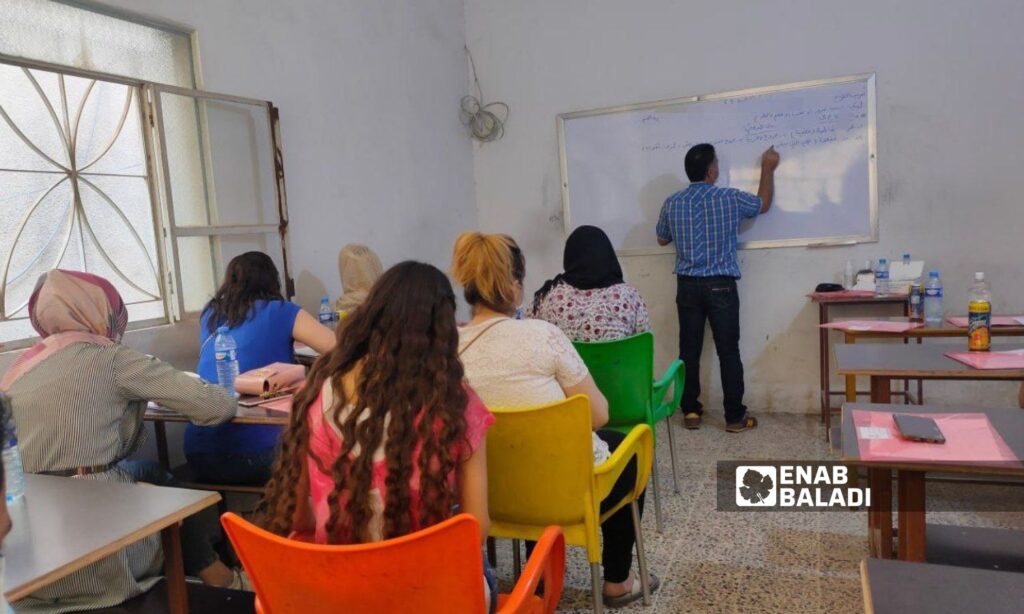Al-Hasakah – Majd al-Salem
At the end of the 2023-2024 academic year, Mohammad al-Haj (59 years old) decided to move from the countryside of Qamishli to the city center for one reason only, to enroll his son in courses for the ninth grade.
Al-Haj told Enab Baladi that the family is forced to move to the city to find educational institutes, as they do not exist in the countryside, despite the high costs.
He mentioned that the monthly house rent is 1,100,000 Syrian pounds (75 US dollars), in addition to the cost of ampere subscription and other monthly family expenses which amount to another 3,000,000 pounds (200 US dollars).
He cannot afford all these expenses alone, but “fortunately” he has two sons in Germany who are covering most of these expenses, including the course fees. Without their support, he would not be able to live in the city, according to him.
In al-Hasakah’s countryside, institutes offering support courses for students are absent, posing a challenge for students and their families, especially for those in the ninth and baccalaureate (high school graduation) grades.
Preparations for the next academic year, 2024-2025, begin after the current year’s exams ended on June 13. The number of students registered to take the basic education and high school certificate exams in various branches exceeded 550,000 students.
Statistics indicate that 10,258 students were registered in al-Hasakah governorate, distributed across 132 exam centers for the high school certificate and 79 centers for the basic education certificate, in both al-Hasakah and Qamishli.
Housing problem
The housing problem is one of the greatest challenges facing families from the countryside who wish to enroll their children in courses for the ninth and baccalaureate certificates.
Enab Baladi observed many cases where families were forced to move from the countryside to the city, bearing financial burdens and debts, in order to enroll their children in educational courses.
Another solution families resort to is housing ninth or high school students with their relatives in the city, despite the “social embarrassment for both parties.”
Thamer al-Hussein (53 years old) from the countryside of al-Qahtaniyah told Enab Baladi that he considers himself luckier than other rural families because he owns a house in Qamishli and moved there about a year ago to continue his children’s education.
He added that he used to rely on the rental income from the house to cover the family’s expenses, but now he is forced to live in the city for his children’s education.
No institutes in the countryside
Regarding the difficulty of opening educational institutes in the countryside, Arabic language teacher Hawash Mohammad (46 years old), from the countryside of Tal Hamis, said that the reason is the small number of students in a single village, which may not exceed ten houses at times.
Another reason, according to the teacher, is the difficult economic conditions that rural residents suffer from, and their inability to pay “satisfactory fees for teachers,” leading teachers to prefer moving to the city. Additionally, rural areas suffer from a lack of services, including electricity.
He added that teachers prefer to move to cities and offer courses there because the fees are double compared to those in the countryside. Personally, he wants to move to the city because of the small number of students he has and their families’ poor financial conditions, to the extent that some of them could not even pay half the course fee, and he offered it to some on credit.
Solutions students resort to
Mohammad Hassoun, a student from the village of Khwitele in the countryside of Qamishli, told Enab Baladi that he is currently preparing for the baccalaureate certificate with his own efforts. His father’s attempts to enroll him in one of the city institutes did not succeed due to the difficulty of finding housing and the high course fees that “have all become in dollars.”
He mentioned that he tried to stay in the village and commute daily to the institute, but that was very difficult, as his village is about 65 kilometers away from Qamishli, and there are villages about 100 kilometers away.
The daily travel cost is 12,000 Syrian pounds, in addition to personal expenses, bringing the total amount to 25,000 pounds.
Hassoun added that the weather is very hot, the road is exhausting, and transportation is not always available, as most village minibuses return around one o’clock in the afternoon, making it impossible for students to attend evening courses.
Currently, Hassoun is trying to follow his lessons through special WhatsApp groups he created with a group of his peers in the countryside and the city. They exchange lessons, notes, summaries, and explanations of the syllabus materials.
The course fees in private institutes vary, some are in dollars, and some are in Syrian pounds.
According to Enab Baladi‘s tour of several institutes, the fees vary depending on the teacher and the number of students in the group or classroom. Some classes have ten students, while others have up to 40 students.
The fees start at a minimum of 1,000,000 Syrian pounds (65 US dollars) per subject in the group and increase depending on the subject.

